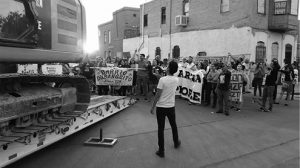DSA Across the USA

Some 350 people attended the Young Democratic Socialists Conference on February 16-18 in Washington, DC And on February 22, the vice-president of the National Rifle Association warned the Conservative Political Action Conference that “there are now over 100 chapters of Young Democratic Socialists of America at many universities. . .” Photo: Kojo Senoo
DSA Long Beach is working in coalition with #SanctuaryLB to pressure the city council to adopt a local policy that would prevent local government and police from spending their resources cooperating with federal immigration enforcement. The project has been an opportunity for DSA activists to learn about the benefits and challenges of working with community groups. On one hand, coalition work has allowed the chapter to build ties to organizations like the Filipino Migrant Center and Long Beach Immigrant Rights Coalition, putting them in touch more directly with the immigrant community. On the other hand, the coalition is mostly nonprofits that meet during the workday, limiting the ability of DSA’s volunteer members to be involved in major decisions. “We’ve found it’s also essential to organize our own autonomous campaigns to develop our capacity and internal democracy,” said Kevin Joerger, who is involved in the project. They’ve done this in part by engaging in more radical tactics than some of their partners might undertake. “We’re not accountable to any funders, so we can push the envelope,” Joerger said, noting that DSA was able to put its message in front of their neoliberal mayor—a known comic fan—by holding a rally outside Long Beach Comic Con.
Metro DC DSA members are expanding their Stomp Out Slumlords (SOS) campaign, which trains activists to go directly to renters in the DC community and make them aware of their rights when they’re served with eviction notices. Canvassers start by asking tenants whether they plan to go to court. If so, SOS helps them connect with the free legal help available at the courthouse, tells them what to expect on the day of the hearing, and gives them a number to call if they have questions. “We’re giving them the power of knowledge, because a lot of these people just don’t know how it works,” says DSA activist Liz Golden. Lately, SOS has tried to spearhead internal organizing among tenants in large apartment complexes to “make their own groups so they can file complaints against the company,” Golden explains. SOS has attracted regular volunteers from outside DSA, including law students and those working in the housing sector, and the project’s leaders have put together a guide for other chapters seeking to launch similar programs.
Santa Fe DSA is working on several campaigns designed to build new organizers’ skills and form alliances within the community. Members have worked with FairVote, a national organization that promotes ranked-choice voting, because of its potential to counter voter suppression and increase the effectiveness of local democracy. “It’s training for our members, giving them experience canvassing and talking to people directly,” said local organizer Cathy Garcia. The chapter is also involved in the Health Security for New Mexicans Campaign, a proposed state government insurance co-op. “New Mexico is one of the poorer states in the nation. If we could get something like this passed in New Mexico, it becomes a lever that other states can use,” says Garcia. Members are lobbying the state legislature. The chapter has also decided to put money donated at meetings into a mutual aid fund, which it can then use to support members or allies in need; they have already used it to donate to a member of The Red Nation, an indigenous rights group, who needed help replacing a broken window. Garcia said all these efforts are designed to build novice organizers’ skills, camaraderie, and ties with the Santa Fe activist community while also taking on urgent problems.
In October, Twin Cities DSA held a Campus Labor Institute at the University of Minnesota. Resurrected from YDS programming of the 1990s by longtime DSA member and union organizer Jeff Lacher, the event provided space for the labor movement to connect with new members with a passion for workers’ rights. Attendees included not only DSAers, but other members of the local community, including grad students seeking to organize. “It allowed us to speak to some people who might not normally take an interest in this,” said Ian Ringgenberg, one of the lead organizers of the event. The opening panel featured a graduate student, an adjunct faculty member, a representative for student workers, and a campus rep for the Teamsters Union. “So often, our administration tries to pit workers and students against each other for scarce resources, so seeing all the perspectives was powerful,” said Ringgenberg. Other sessions offered an introduction to organizing, the history of class war, labor issues for people of color, and organizing as socialists.
El Chuco del Norte DSA (El Paso) has become key to a community effort to protect a neighborhood being targeted for anti-democratic development. Although the community voted by a wide margin in 2012 to fund libraries, a fine arts center, a children’s museum, and a multi-purpose center, developers have tried to build a sports arena in the Duranguito neighborhood. A state judge later ruled that this was unacceptable, but developers have continued to try to take control of buildings in the neighborhood. Early in the morning on September 12, 2017, they staged an unannounced demolition of five residential and commercial buildings whose residents had been forced and manipulated into leaving, according to Selfa A. Chew and Alejandra Alcalde. Since that time, DSA members have been part of a group of residents, students, and activists who have taken shifts to ensure the protection of other buildings at risk of illegal demolition. Activists have also created a street museum around the camp, exhibiting images and information on the historical value of the neighborhood. ϖ
 Democratic Socialists of America
Democratic Socialists of America
